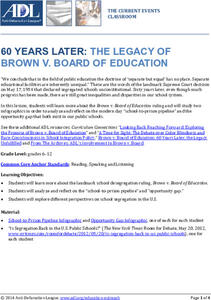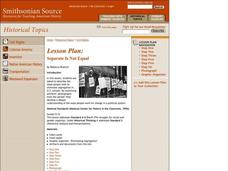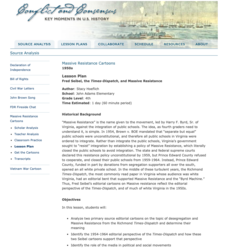Judicial Branch of California
Separate But Equal - Is It Black or White?
The story of Ruby Bridges and the case of Brown vs. The Board of Education are fantastic tools for discussing the concept of separate but equal. Kids tackle some big questions about what is fair, what is civil, and what rights or laws...
Smithsonian Institution
Separate is Not Equal: Fight for Desegregation
Separate is not equal! An eye-opening lesson delves into the past to understand the fight for desegregation and how it impacted African American communities. Academics complete two one-hour lessons using documents, photographs, and...
Curated OER
Plessy V. Ferguson: "Separate but Equal," Equal Protection
Students explore the details and impact of the Plessy vs. Ferguson U.S. Supreme Court case. In this U.S. History instructional activity, students participate in several group discussions and group activities that examine both sides of...
Curated OER
The Fight to End "Separate but Equal" in American Schools
Students study the court cases related to Brown v. Board of Education and the "separate but equal" standard established by Plessy v. Ferguson. They create an informational display that can be used to teach others the particulars of the...
Curated OER
Segregation: From Jim Crow to Linda Brown
Students examine the African American social, economic, and political conditions between 1896 and 1953. In this segregation activity, students analyze primary sources to develop an understanding of the plight of African Americans'...
Curated OER
Massive Resistance and School Integration
Fourth graders write a short story that shows their feelings on a chosen historical perspective on school integration of the past. In this school integration lesson plan, 4th graders learn about Separate But Equal, resistance to change,...
State Bar of Texas
Plessy v. Ferguson
Where did separate but equal originate and what does it mean? Scholars investigate the Supreme Court Case Plessy v. Ferguson. Using a short video clip, they analyze the impact the decision of legal segregation had on society in 1896....
Curated OER
Race, Language and Separation
Sixth graders discuss the idea of separation in today's society. In groups, they examine the laws used in the past with a focus on "separate, but equal". They review the Brown v. Board of Education case and determine if it caused or...
Education World
Now Let Me Fly -- A Black History Reader's Theater Script
Young scholars study African American history, Jim Crow laws, and seperate but equal statutes by performing a Reader's Theater script. They perform Marcia Cebulska's, Now Let Me Fly, which may be requested online.
State Bar of Texas
Sweatt v. Painter
Is separate but equal actually equal? The 1950 Supreme Court case Sweatt v. Painter discusses the law of segregation and inequality. Scholars investigate the impact of the case on the desegregation of public schools across the nation...
Carolina K-12
African Americans in the United States Congress During Reconstruction
The Civil Rights Act of 1866, which granted citizenship to all males in the U.S., resulted in the first African Americans to be elected to Congress. Class members research 11 of these men, the challenges they faced, and craft...
Curated OER
From Jim Crow To Linda Brown: A Retrospective of the African-American Experience from 1897 to 1953
Students examine African American issue between the years 1897 and 1953. In this African American history lesson, students research the social, economic, and political conditions of African Americans during the aforementioned time span...
Anti-Defamation League
60 Years Later: The Legacy of Brown v. Board of Education
Although the 1954 U.S. Supreme Court decision Brown v. Board of Education declared segregated schools unconstitutional, huge inequalities still exist in U.S. public schools. Learners analyze and discuss data presented in two...
Curated OER
The Little Rock Central High Crisis
Eighth graders identify the events that led to the Little Rock Central High Crisis. They observe and explain the causes and affects of the Little Rock Central High Crisis.
Advocates for Human Rights
The Rights of Women in the United States
Six diverse activities make up a substantial unit on the women's rights movement in the United States, past and present. A few of the topics at hand: the fourteenth and nineteenth amendments, the Equal Pay Act, the Lily Ledbetter Act,...
Curated OER
Stealing Second: History in the Making
In this Stealing Second: History in the Making lesson, students evaluate the internet and newspaper as separate and credible resources. Students analyze Clemente as a baseball player and humanitarian. Students create a class timeline...
Curated OER
The Battleground: Separate and Unequal Education
Students investigate the history of unequal education in the United States and the impact on African American history. In this unequal history activity, students discuss the purpose of education and describe an ideal school. Students...
Curated OER
Breaking Barriers with Melba Pattillo
Students are introduced to individuals who made the civil rights movement a success. They examine, analyze and interpret the events and people who had a significant and stirring impact on the course of history through stories, interviews...
Curated OER
From Jim Crow to Linda Brown: A Retrospective of the African-American Experience from 1897 to 1953.
Students research the American Memory collection to explore the African-American experience from 1897 to 1953.
Curated OER
Separate Is Not Equal
Based on discussion, analysis of primary source documents, and with the help of a graphic organizer, young historians discover the steps that were taken to eliminate segregation in public schools in the United States. This instructional...
Roy Rosenzweig Center for History and New Media
Fred Seibel, the Times-Dispatch, and Massive Resistance
A lesson challenges scholars to analyze editorial cartoons created by Fred Seibel, illustrator for the Times-Dispatch, during the Massive Resistance. A class discussion looking at today's editorial pages and Jim Crow Laws leads the way...
Curated OER
Religious Freedom
Sixth graders examine the religious issues of the early settlers in the New World and the current issue of separation of church and state. They discuss a list of colonial laws from the 1600s, participate in a class discussion, and in...
Curated OER
Multicultural Issues and the Law: Gender and Race Based Schooling
Students examine the problems associated with gender based and race based education. In groups, they research the history of education and the laws that have changed education and impacted lives. They brainstorm a list of the positives...
Curated OER
An Introduction to the Central High Crisis
Students identify key events and participants in the Central High Crisis

























